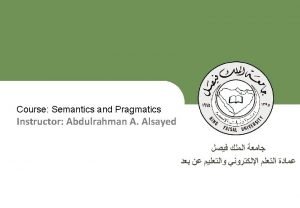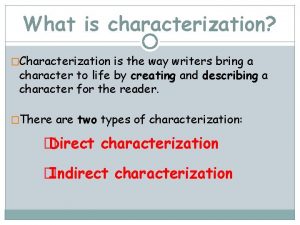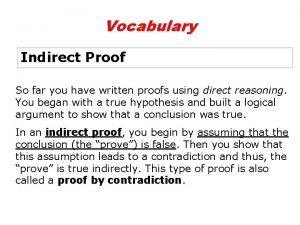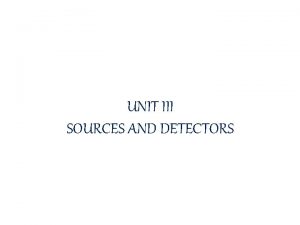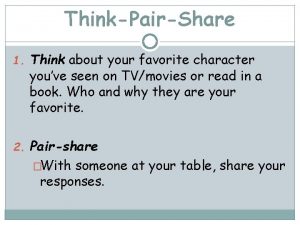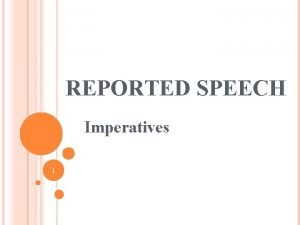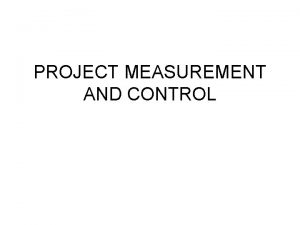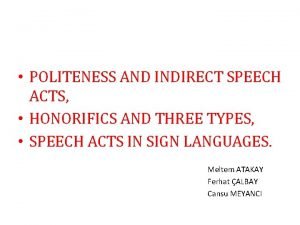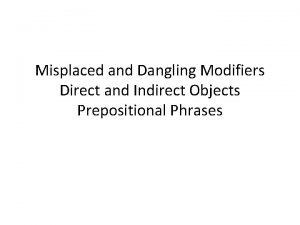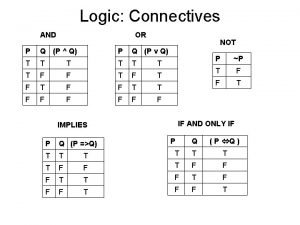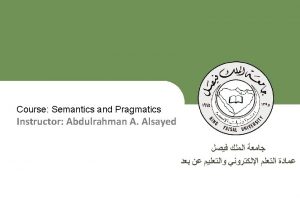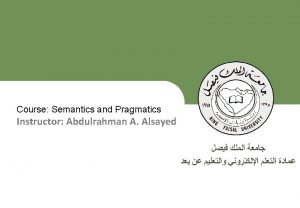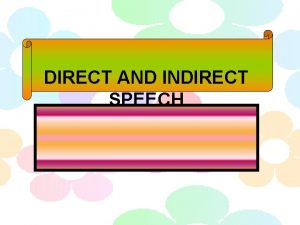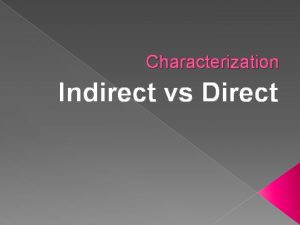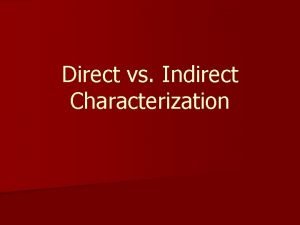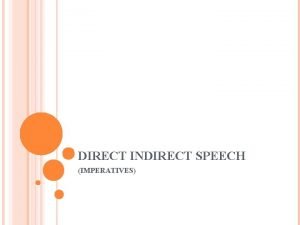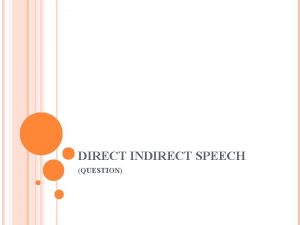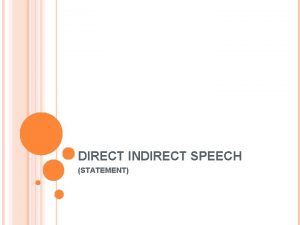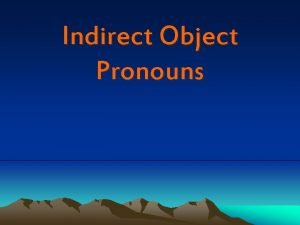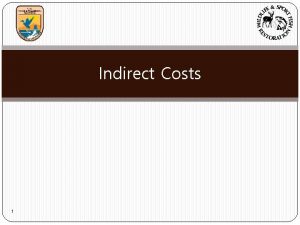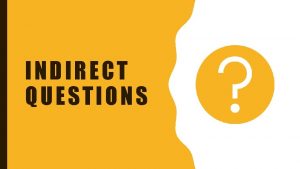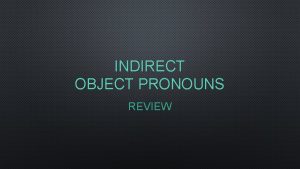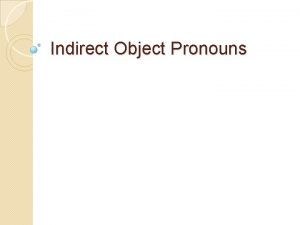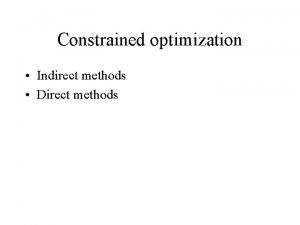Direct and indirect Illocutions Deanship of ELearning and

















- Slides: 17



Direct and indirect Illocutions ﻋﻤﺎﺩﺓ ﺍﻟﺘﻌﻠﻢ ﺍﻹﻟﻜﺘﺮﻭﻧﻲ ﻭﺍﻟﺘﻌﻠﻴﻢ ﻋﻦ ﺑﻌﺪ Deanship of E-Learning and Distance Education ][ 3 [ ] ﺟﺎﻣﻌﺔ ﺍﻟﻤﻠﻚ ﻓﻴﺼﻞ King Faisal University

Direct and indirect Illocutions An utterance may have one illocution or more than one illocution at the same time. E. g. 1. “Pass the salt. ” We have one illocutionary act in this utterance: requesting. E. g. 2. ‘Can you pass the salt? ’ This examples carries out two illocutionary acts simultaneously: asking and requesting. ﻋﻤﺎﺩﺓ ﺍﻟﺘﻌﻠﻢ ﺍﻹﻟﻜﺘﺮﻭﻧﻲ ﻭﺍﻟﺘﻌﻠﻴﻢ ﻋﻦ ﺑﻌﺪ Deanship of E-Learning and Distance Education ][ 4 [ ] ﺟﺎﻣﻌﺔ ﺍﻟﻤﻠﻚ ﻓﻴﺼﻞ King Faisal University

Direct and indirect Illocutions E. g. 3. ‘That will be 10 Riyals, please. ’ This examples carries out two illocutionary acts simultaneously: informing and requesting. As we have seen from these examples, an utterance can have more than one illocution. In examples with two illocutions, one of the illocutions is called direct and the other is indirect. This leads us to introduce the distinction between direct and indirect illocutions in the next section. ﻋﻤﺎﺩﺓ ﺍﻟﺘﻌﻠﻢ ﺍﻹﻟﻜﺘﺮﻭﻧﻲ ﻭﺍﻟﺘﻌﻠﻴﻢ ﻋﻦ ﺑﻌﺪ Deanship of E-Learning and Distance Education ][ 5 [ ] ﺟﺎﻣﻌﺔ ﺍﻟﻤﻠﻚ ﻓﻴﺼﻞ King Faisal University

Direct and indirect Illocutions The direct illocutionary act (direct illocution) of an utterance is the illocution most directly indicated by a literal reading of the grammatical form and vocabulary of the sentence uttered. The indirect illocutionary act (indirect illocution) of an utterance is any further illocution the utterance may have other than what it expresses literally. ﻋﻤﺎﺩﺓ ﺍﻟﺘﻌﻠﻢ ﺍﻹﻟﻜﺘﺮﻭﻧﻲ ﻭﺍﻟﺘﻌﻠﻴﻢ ﻋﻦ ﺑﻌﺪ Deanship of E-Learning and Distance Education ][ 6 [ ] ﺟﺎﻣﻌﺔ ﺍﻟﻤﻠﻚ ﻓﻴﺼﻞ King Faisal University

Direct and indirect Illocutions In example 2, the direct illocution of ‘Can you pass the salt? ’ is an enquiry about the hearer’s ability to pass the salt. The indirect illocution is a request that the hearer pass the salt. Similarly, in example 3, the direct illocution of ‘That will be 10 Riyals, please. ’ is informing the hearer of the price he needs to pay. The indirect illocution is a request that he pays that price. ﻋﻤﺎﺩﺓ ﺍﻟﺘﻌﻠﻢ ﺍﻹﻟﻜﺘﺮﻭﻧﻲ ﻭﺍﻟﺘﻌﻠﻴﻢ ﻋﻦ ﺑﻌﺪ Deanship of E-Learning and Distance Education ][ 7 [ ] ﺟﺎﻣﻌﺔ ﺍﻟﻤﻠﻚ ﻓﻴﺼﻞ King Faisal University

Direct and indirect Illocutions The difference between utterances with one direct illocution and utterances with two direct and indirect illocutions is seen through the fact that a deliberately unhelpful reply can be given to an utterance which has direct and indirect illocutions. For example, in reply to a speaker’s utterance ‘I must ask you to leave’ the hearer might say, thwarting the intentions of the speaker: ‘Must you? ’ ﻋﻤﺎﺩﺓ ﺍﻟﺘﻌﻠﻢ ﺍﻹﻟﻜﺘﺮﻭﻧﻲ ﻭﺍﻟﺘﻌﻠﻴﻢ ﻋﻦ ﺑﻌﺪ Deanship of E-Learning and Distance Education ][ 8 [ ] ﺟﺎﻣﻌﺔ ﺍﻟﻤﻠﻚ ﻓﻴﺼﻞ King Faisal University

Direct and indirect Illocutions The previous example carried out two illocutionary acts: direct (asking) and indirect (ordering). The hearer chose to ignore the speaker’s intention (indirect illocution : ordering the hearer to leave), and gave a deliberately unhelpful reply to the direct illocution (asking) made by the speaker: “Must you? ”. On the other hand, a helpful reply would have been: “OK, I will leave straight away. ” or “No, I will not leave. ” Note: We will talk more about this point (speakers being helpful) in our discussion of the cooperative principle in the next lecture. ﻋﻤﺎﺩﺓ ﺍﻟﺘﻌﻠﻢ ﺍﻹﻟﻜﺘﺮﻭﻧﻲ ﻭﺍﻟﺘﻌﻠﻴﻢ ﻋﻦ ﺑﻌﺪ Deanship of E-Learning and Distance Education ][ 9 [ ] ﺟﺎﻣﻌﺔ ﺍﻟﻤﻠﻚ ﻓﻴﺼﻞ King Faisal University

Direct and indirect Illocutions • Classes of illocutionary acts: Illocutionary acts can be classified into different categories, depending on the type of interaction between the speaker and the hearer that they perform. We will focus on the following two classes of illocutionary acts: directives and commissives. ﻋﻤﺎﺩﺓ ﺍﻟﺘﻌﻠﻢ ﺍﻹﻟﻜﺘﺮﻭﻧﻲ ﻭﺍﻟﺘﻌﻠﻴﻢ ﻋﻦ ﺑﻌﺪ Deanship of E-Learning and Distance Education ][ 10 [ ] ﺟﺎﻣﻌﺔ ﺍﻟﻤﻠﻚ ﻓﻴﺼﻞ King Faisal University

Direct and indirect Illocutions A) Directive Acts A directive act is any illocutionary act which essentially involves the speaker trying to get the hearer to behave in some required way. For example, ordering and suggesting are directive acts. On the other hand apologizing and promising are not directive acts because they do not try to direct the hearer to behave in a certain way. Directives also include: requesting, demanding, insisting, instructing, inviting, etc. ﻋﻤﺎﺩﺓ ﺍﻟﺘﻌﻠﻢ ﺍﻹﻟﻜﺘﺮﻭﻧﻲ ﻭﺍﻟﺘﻌﻠﻴﻢ ﻋﻦ ﺑﻌﺪ Deanship of E-Learning and Distance Education ][ 11 [ ] ﺟﺎﻣﻌﺔ ﺍﻟﻤﻠﻚ ﻓﻴﺼﻞ King Faisal University

Direct and indirect Illocutions B) Commissive Acts A commissive act is any illocutionary act which essentially involves the speaker committing himself to behave in some required way. For example, promising and swearing to do something are commissive acts. On the other hand, ordering and thanking are not commissive acts. Commissives also include: giving one’s word, guaranteeing, offering, vowing, etc. ﻋﻤﺎﺩﺓ ﺍﻟﺘﻌﻠﻢ ﺍﻹﻟﻜﺘﺮﻭﻧﻲ ﻭﺍﻟﺘﻌﻠﻴﻢ ﻋﻦ ﺑﻌﺪ Deanship of E-Learning and Distance Education ][ 12 [ ] ﺟﺎﻣﻌﺔ ﺍﻟﻤﻠﻚ ﻓﻴﺼﻞ King Faisal University

Direct and indirect Illocutions There are other classes of illocution (e. g. expressives, representatives. . etc. ) which we will not talk about in detail in this course. If we look at illocutions like thanking and apologizing, for example, we see that they do not belong to either of the directive or commissive acts that we have mentioned. You can refer to your reference books if you are interested to see how we classify these locutions. ﻋﻤﺎﺩﺓ ﺍﻟﺘﻌﻠﻢ ﺍﻹﻟﻜﺘﺮﻭﻧﻲ ﻭﺍﻟﺘﻌﻠﻴﻢ ﻋﻦ ﺑﻌﺪ Deanship of E-Learning and Distance Education ][ 13 [ ] ﺟﺎﻣﻌﺔ ﺍﻟﻤﻠﻚ ﻓﻴﺼﻞ King Faisal University

Direct and indirect Illocutions Be careful not to confuse the terms ‘direct’ and ‘directive’. We use the term ‘direct’ to talk about how an illocution is carried out, i. e. whether directly or indirectly. The term ‘directive’ is used for the kind of act carried out, i. e. directing someone to do something. Thus, there can be directives (e. g. ‘Pass the salt. ’) and indirectives (e. g. ‘Can you pass the salt? ’). There can also be both direct and indirect commissives. ﻋﻤﺎﺩﺓ ﺍﻟﺘﻌﻠﻢ ﺍﻹﻟﻜﺘﺮﻭﻧﻲ ﻭﺍﻟﺘﻌﻠﻴﻢ ﻋﻦ ﺑﻌﺪ Deanship of E-Learning and Distance Education ][ 14 [ ] ﺟﺎﻣﻌﺔ ﺍﻟﻤﻠﻚ ﻓﻴﺼﻞ King Faisal University

Direct and indirect Illocutions Let us look at some examples of direct and indirectives/direct and indirect commissives to make the difference between them clearer to you. • Direct directive illocutions: E. g. 1. ‘Stop. ’ (ordering) E. g. 2. ‘Go away. ’ (ordering) • Indirective illocution: E. g. 1. ‘I would like some water. ’ (requesting) E. g. 2. ‘I would appreciate it if you talked ﻓﻴﺼﻞ quietly. ’ ﻋﻤﺎﺩﺓ ﺍﻟﺘﻌﻠﻢ ﺍﻹﻟﻜﺘﺮﻭﻧﻲ ﻭﺍﻟﺘﻌﻠﻴﻢ ﻋﻦ ﺑﻌﺪ ﺟﺎﻣﻌﺔ ﺍﻟﻤﻠﻚ Deanship of E-Learning and Distance Education ][ 15 [ ] King Faisal University

Direct and indirect Illocutions • Direct commissive illocution: E. g. 1. ‘I promise to be there promptly. ’ (promising) E. g. 2. ‘I swear I’ll be there tomorrow. ’ (swearing) • Indirect commissive illocution: E. g. 1. ‘Can I help you? ’ (offering) E. g. 2. ‘If you need me at any time, just call. ’ (offering) ﻋﻤﺎﺩﺓ ﺍﻟﺘﻌﻠﻢ ﺍﻹﻟﻜﺘﺮﻭﻧﻲ ﻭﺍﻟﺘﻌﻠﻴﻢ ﻋﻦ ﺑﻌﺪ Deanship of E-Learning and Distance Education ][ 16 [ ] ﺟﺎﻣﻌﺔ ﺍﻟﻤﻠﻚ ﻓﻴﺼﻞ King Faisal University

 Direct illocution example
Direct illocution example What is indirect and direct characterization
What is indirect and direct characterization Is characterization
Is characterization Indirect proof assumption
Indirect proof assumption Direct and indirect band gap semiconductors
Direct and indirect band gap semiconductors Indirect characterization thoughts examples
Indirect characterization thoughts examples Is combined gas law direct or indirect
Is combined gas law direct or indirect Identify the type of sentence
Identify the type of sentence Tom said 'i want to visit my friends this weekend.'
Tom said 'i want to visit my friends this weekend.' Reported speech order examples
Reported speech order examples Peer review process cmmi
Peer review process cmmi Speech act
Speech act Direct indirect observation
Direct indirect observation Direct and indirect observation examples
Direct and indirect observation examples Dangling modifier
Dangling modifier Direct and indirect competitors examples
Direct and indirect competitors examples Direct proof and indirect proof
Direct proof and indirect proof Reported speech learning objectives
Reported speech learning objectives
